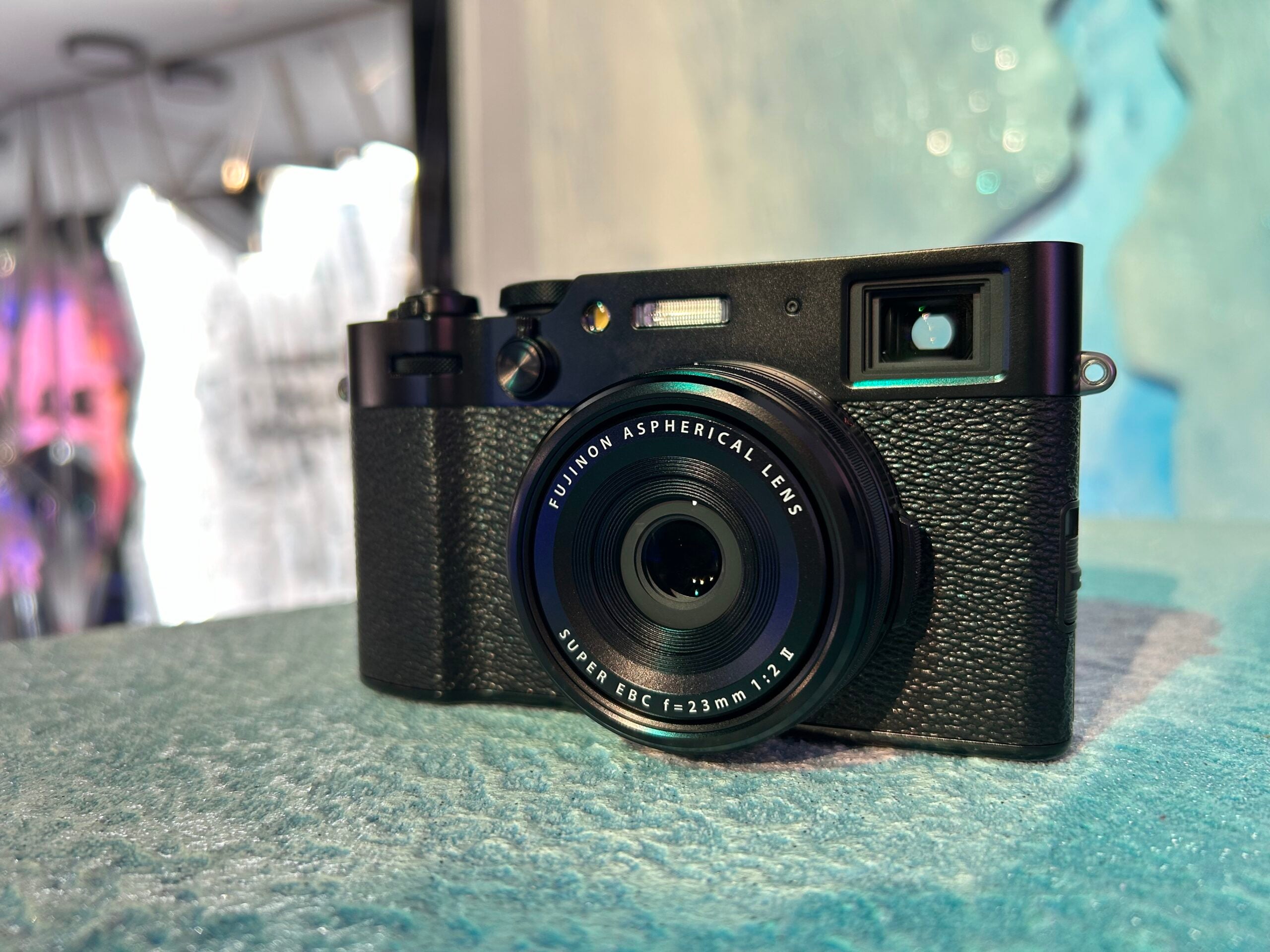First Impressions
Fujifilm celebrates its 90th anniversary with what could be its best compact digital camera to date. Updated subject detection modes, 5-axis IBIS, 6.2K video, and the usual hybrid viewfinder make the Fujifilm X100VI a versatile all-in-one digital camera.
-
40.2-megapixel sensorX-Trans CMOS 5 HR back-illuminated sensor -
X-Processor 5Improved subject detection and power efficiency -
Hybrid viewfinderMove between optical and electronic viewfinder -
5-axis IBISUp to 6.0 stops of image stabilisation
Introduction
Fujifilm has officially unveiled the latest update to its hugely popular X100 Series. The X100VI (pronounced “six”) is the 2024 model in the compact camera line, replacing the 5-star X100V.
The Fujifilm X100VI is certainly an exciting update on paper, with its large 40-megapixel sensor, updated AF thanks to the X-Processor 5, and the addition of IBIS for the first time in an X100 Series camera.
The camera will be available to buy from February 28th and carries an RRP of $1599/£1599/€1799.
I got the chance to spend some time with the X100VI ahead of its launch in Tokyo. Stay on this page for our first impressions of Fujifilm’s newest compact camera.
Design
- The Fujifilm X100VI has a mostly unchanged design
- Shoot using the 2-way tilting monitor or hybrid viewfinder
- Camera includes a fixed 23mm f/2.0 lens (35mm equivalent)
The Fujifilm X100VI has a slim, timeless design that doesn’t stray far from the appearance of the X100V that came before it.
The top and bottom edges of the camera are made from lightweight aluminium, pressed to create sharp lines, while the grip feels comfortable and secure in the hand. The camera is slightly heavier than its predecessor at 521g including the battery and memory card.
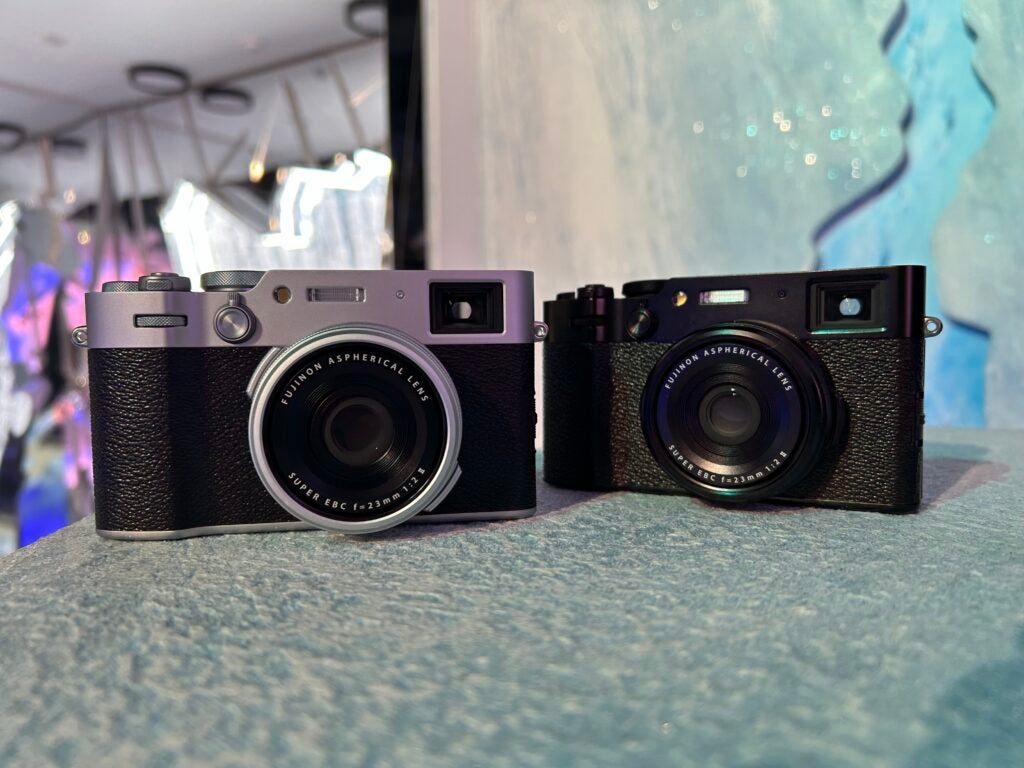
The design feels both classic and stylish, with the camera available in both black and silver finishes.
For those interested in a more exclusive design, Fujifilm has also announced a limited edition version of the X100VI to celebrate the brand’s 90th anniversary with the original Fujifilm logo, a soft release button, and a special strap.
However, this model is more pricey at $1999/£1999/€2199 and will be restricted to 1934 units worldwide, so you might have to fight in order to get your hands on one.
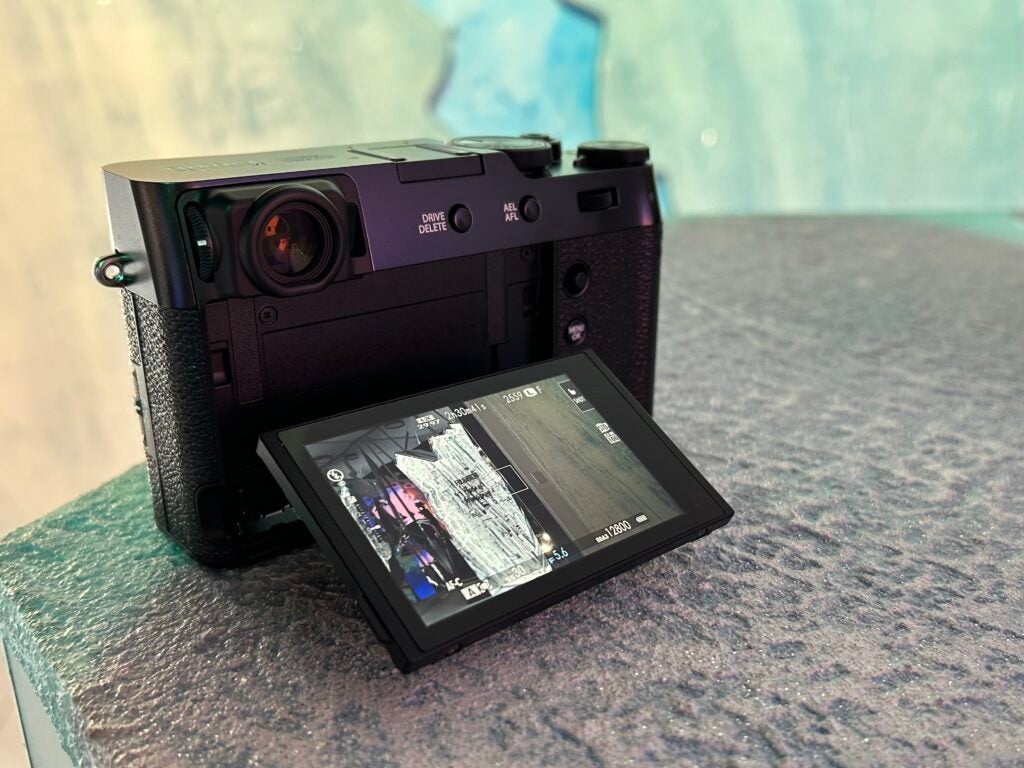
The X100VI features a 3-inch 2-way tilting LCD monitor that I found was handy for shooting from high and low angles. Though Fujifilm has upped the video resolution on the X100V, I wouldn’t necessarily recommend the camera for vlogging, as the monitor doesn’t flip out and there are no vlogging-centric features to note.
The X100VI also takes advantage of the hybrid viewfinder seen on the X100V. The versatile viewfinder design allows you to move between the optical viewfinder and OLED EVF when needed. The Electronic Rangefinder function also displays a small EVF on the OVF, giving you a magnified view of the area in focus as well as outside of the frame lines.
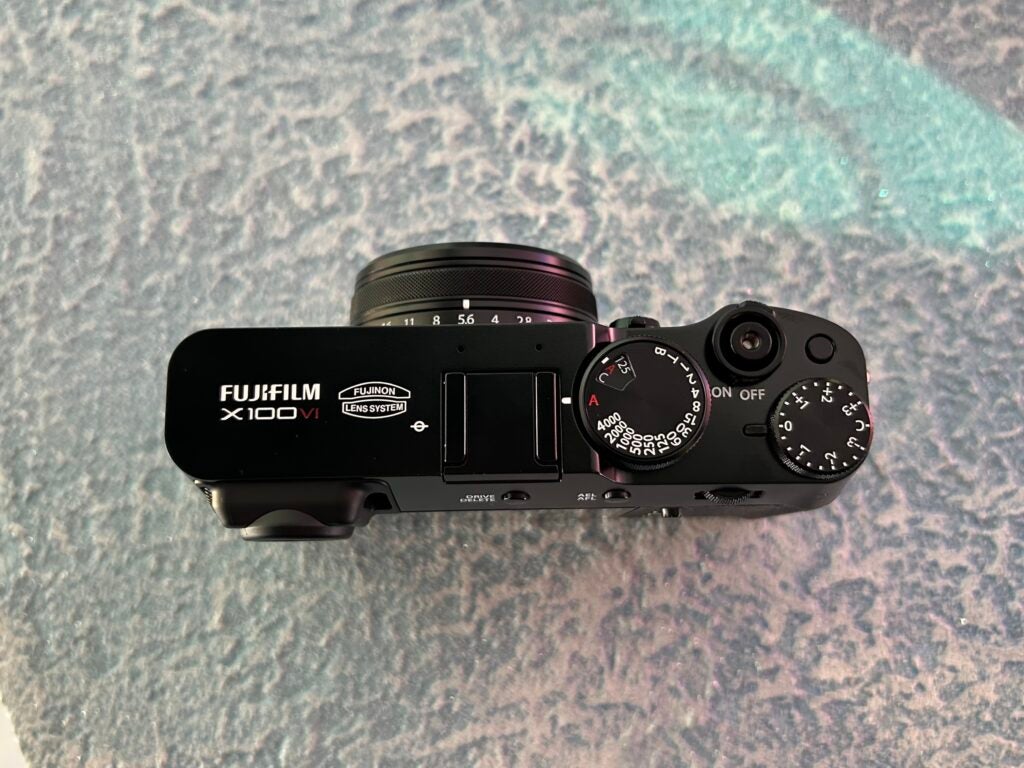
With this update, Fujifilm has adjusted the positioning of the buttons on the rear of the X100VI to make the camera easier to operate with one hand, and I found myself shooting with just my right hand quite often.
Otherwise, the controls and dials are generally the same as those found on the X100V.
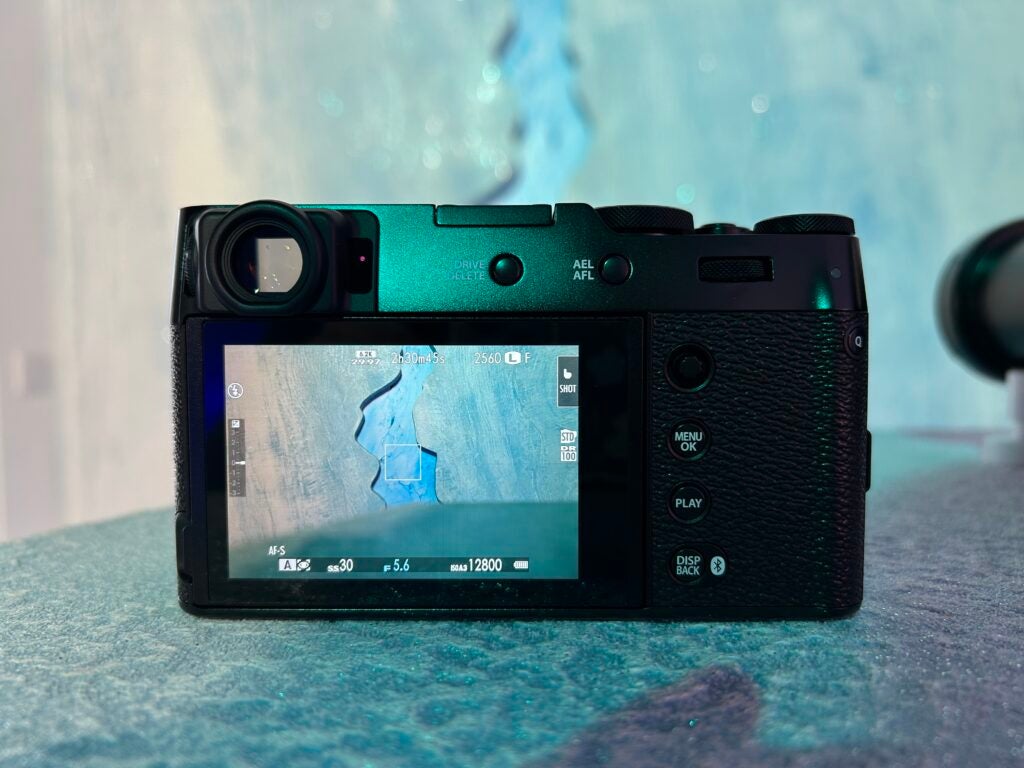
The camera comes with a fixed 23mm f/2.0 lens equivalent to 35mm format on the APS-C sensor. This is a versatile focal length well-suited to shooting a wide variety of subjects, from portraits to street photography, and the size of the lens makes this camera no hassle to throw into your bag.
Some will certainly find the prospect of a fixed lens limiting, so that’s worth bearing in mind if you plan to make this your sole camera. That said, the camera can be paired with Fujifilm’s wide and tele conversion lenses (sold separately) to achieve different focal lengths.
Finally, the X100VI includes a single memory card slot for UHS-I SD cards.
Features
- Packs a large 40.2-megapixel image sensor
- Multiple new subject detection and tracking modes
- The addition of IBIS is new for the X100 Series
The Fujifilm X100VI pairs the 40.2-megapixel X-Trans CMOS 5 HR image sensor found in the Fujifilm X-H2 and X-T5 with the X-Processor 5 found across a large number of Fuji’s recent X Series cameras.
The addition of the X-Processor 5 brings a number of improvements and new features to the X100 Series, including expanded subject detection and tracking.
With the help of AI, the X100VI is capable of detecting animals, birds, cars, motorcycles, bicycles, aeroplanes, trains, insects and drones. Face and eye AF has also been improved by the new image processor.
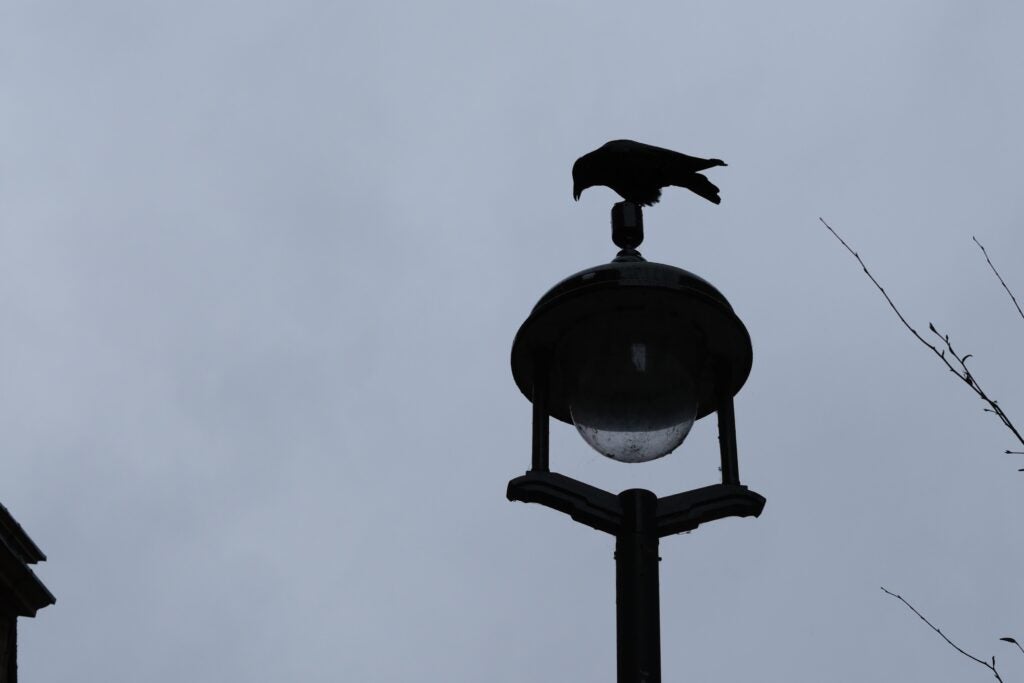
I found the autofocus to be impressively fast to detect people and eyes, as well as cars and birds, making the camera ideal for street photography. I didn’t always have the same luck with bicycles and motorcycles, but hope to put this to the test properly during my eventual full review.
Another benefit of the new processor is the improved power efficiency. While this isn’t actually reflected in the battery life – you can blame the in-body image stabilisation for that – it does make it possible to capture a similar number of shots to the X100V, with the power efficiency essentially counteracting the power drainage of the IBIS.

ISO 125 has gone from being an extended sensitivity option of the X100V to a native option on the X100VI, and the X100VI supports 11fps continuous shooting with the mechanical shutter or up to 20fps with the electronic one.
I used the 11fps setting to capture the rush of pedestrians at Shibuya Crossing and found it fast enough to capture a large number of shots with the face AF working tirelessly.

Finally, the X100VI has a built-in 4-stop ND filter and a total of 20 Film Simulation modes with the addition of Reala Ace. I used the Classic Neg Film Simulation mode when shooting at night to achieve this highly contrasted look straight out of the camera.
Image quality
- The X100VI captures sharp and bright stills
- Sports an increased 6.2K/30p video resolution
- F-Log/F-Log 2 and 4:2:2 10-bit video are also supported
The Fujifilm X100VI is made for capturing high-quality images on the go and I greatly enjoyed the short time I spent shooting with it.
Stills are bright and sharp, and the f/2.0 aperture on the lens allowed for a more shallow depth of field when I wanted to highlight my subject and soften the background.
The video resolution has increased with this update from 4K/30p on the X100V to 6.2K/30p (cropped) or 4K/60p on the X100VI. The camera supports F-Log, F-Log 2, and 4:2:2 10-bit video and touch tracking is a new addition to the X100 Series.
As with stills, I found videos shot on the X100VI to be bright and detailed, though the process of switching from photo to video modes and back when you’re out and about can feel a little clunky.
It seems safe to say the X100VI remains a stills-first camera at its heart, but photographers looking for a hybrid model shouldn’t dismiss the new X100 Series camera outright.
Early Verdict
Fujifilm celebrates its 90th anniversary with what could be its best compact digital camera to date. Updated subject detection modes, 5-axis IBIS, 6.2K video, and the usual hybrid viewfinder make the Fujifilm X100VI a versatile all-in-one digital camera.
I’ll need to fully test the Fujifilm X100VI before coming to a final verdict, but this promising compact snapper has everything required to be one of the best compact cameras of 2024.
First Impressions
Fujifilm celebrates its 90th anniversary with what could be its best compact digital camera to date. Updated subject detection modes, 5-axis IBIS, 6.2K video, and the usual hybrid viewfinder make the Fujifilm X100VI a versatile all-in-one digital camera.
-
40.2-megapixel sensorX-Trans CMOS 5 HR back-illuminated sensor -
X-Processor 5Improved subject detection and power efficiency -
Hybrid viewfinderMove between optical and electronic viewfinder -
5-axis IBISUp to 6.0 stops of image stabilisation
Introduction
Fujifilm has officially unveiled the latest update to its hugely popular X100 Series. The X100VI (pronounced “six”) is the 2024 model in the compact camera line, replacing the 5-star X100V.
The Fujifilm X100VI is certainly an exciting update on paper, with its large 40-megapixel sensor, updated AF thanks to the X-Processor 5, and the addition of IBIS for the first time in an X100 Series camera.
The camera will be available to buy from February 28th and carries an RRP of $1599/£1599/€1799.
I got the chance to spend some time with the X100VI ahead of its launch in Tokyo. Stay on this page for our first impressions of Fujifilm’s newest compact camera.
Design
- The Fujifilm X100VI has a mostly unchanged design
- Shoot using the 2-way tilting monitor or hybrid viewfinder
- Camera includes a fixed 23mm f/2.0 lens (35mm equivalent)
The Fujifilm X100VI has a slim, timeless design that doesn’t stray far from the appearance of the X100V that came before it.
The top and bottom edges of the camera are made from lightweight aluminium, pressed to create sharp lines, while the grip feels comfortable and secure in the hand. The camera is slightly heavier than its predecessor at 521g including the battery and memory card.

The design feels both classic and stylish, with the camera available in both black and silver finishes.
For those interested in a more exclusive design, Fujifilm has also announced a limited edition version of the X100VI to celebrate the brand’s 90th anniversary with the original Fujifilm logo, a soft release button, and a special strap.
However, this model is more pricey at $1999/£1999/€2199 and will be restricted to 1934 units worldwide, so you might have to fight in order to get your hands on one.

The X100VI features a 3-inch 2-way tilting LCD monitor that I found was handy for shooting from high and low angles. Though Fujifilm has upped the video resolution on the X100V, I wouldn’t necessarily recommend the camera for vlogging, as the monitor doesn’t flip out and there are no vlogging-centric features to note.
The X100VI also takes advantage of the hybrid viewfinder seen on the X100V. The versatile viewfinder design allows you to move between the optical viewfinder and OLED EVF when needed. The Electronic Rangefinder function also displays a small EVF on the OVF, giving you a magnified view of the area in focus as well as outside of the frame lines.

With this update, Fujifilm has adjusted the positioning of the buttons on the rear of the X100VI to make the camera easier to operate with one hand, and I found myself shooting with just my right hand quite often.
Otherwise, the controls and dials are generally the same as those found on the X100V.

The camera comes with a fixed 23mm f/2.0 lens equivalent to 35mm format on the APS-C sensor. This is a versatile focal length well-suited to shooting a wide variety of subjects, from portraits to street photography, and the size of the lens makes this camera no hassle to throw into your bag.
Some will certainly find the prospect of a fixed lens limiting, so that’s worth bearing in mind if you plan to make this your sole camera. That said, the camera can be paired with Fujifilm’s wide and tele conversion lenses (sold separately) to achieve different focal lengths.
Finally, the X100VI includes a single memory card slot for UHS-I SD cards.
Features
- Packs a large 40.2-megapixel image sensor
- Multiple new subject detection and tracking modes
- The addition of IBIS is new for the X100 Series
The Fujifilm X100VI pairs the 40.2-megapixel X-Trans CMOS 5 HR image sensor found in the Fujifilm X-H2 and X-T5 with the X-Processor 5 found across a large number of Fuji’s recent X Series cameras.
The addition of the X-Processor 5 brings a number of improvements and new features to the X100 Series, including expanded subject detection and tracking.
With the help of AI, the X100VI is capable of detecting animals, birds, cars, motorcycles, bicycles, aeroplanes, trains, insects and drones. Face and eye AF has also been improved by the new image processor.

I found the autofocus to be impressively fast to detect people and eyes, as well as cars and birds, making the camera ideal for street photography. I didn’t always have the same luck with bicycles and motorcycles, but hope to put this to the test properly during my eventual full review.
Another benefit of the new processor is the improved power efficiency. While this isn’t actually reflected in the battery life – you can blame the in-body image stabilisation for that – it does make it possible to capture a similar number of shots to the X100V, with the power efficiency essentially counteracting the power drainage of the IBIS.

ISO 125 has gone from being an extended sensitivity option of the X100V to a native option on the X100VI, and the X100VI supports 11fps continuous shooting with the mechanical shutter or up to 20fps with the electronic one.
I used the 11fps setting to capture the rush of pedestrians at Shibuya Crossing and found it fast enough to capture a large number of shots with the face AF working tirelessly.

Finally, the X100VI has a built-in 4-stop ND filter and a total of 20 Film Simulation modes with the addition of Reala Ace. I used the Classic Neg Film Simulation mode when shooting at night to achieve this highly contrasted look straight out of the camera.
Image quality
- The X100VI captures sharp and bright stills
- Sports an increased 6.2K/30p video resolution
- F-Log/F-Log 2 and 4:2:2 10-bit video are also supported
The Fujifilm X100VI is made for capturing high-quality images on the go and I greatly enjoyed the short time I spent shooting with it.
Stills are bright and sharp, and the f/2.0 aperture on the lens allowed for a more shallow depth of field when I wanted to highlight my subject and soften the background.
The video resolution has increased with this update from 4K/30p on the X100V to 6.2K/30p (cropped) or 4K/60p on the X100VI. The camera supports F-Log, F-Log 2, and 4:2:2 10-bit video and touch tracking is a new addition to the X100 Series.
As with stills, I found videos shot on the X100VI to be bright and detailed, though the process of switching from photo to video modes and back when you’re out and about can feel a little clunky.
It seems safe to say the X100VI remains a stills-first camera at its heart, but photographers looking for a hybrid model shouldn’t dismiss the new X100 Series camera outright.
Early Verdict
Fujifilm celebrates its 90th anniversary with what could be its best compact digital camera to date. Updated subject detection modes, 5-axis IBIS, 6.2K video, and the usual hybrid viewfinder make the Fujifilm X100VI a versatile all-in-one digital camera.
I’ll need to fully test the Fujifilm X100VI before coming to a final verdict, but this promising compact snapper has everything required to be one of the best compact cameras of 2024.


















